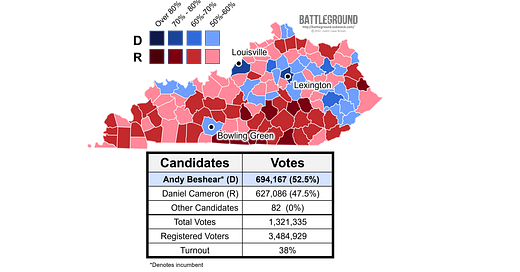Black Republicans Aren't Winners, Just Look at Kentucky
Historically, Black Republican candidates for statewide office just can't seem to pull out a win on Election Day.
Topline Takeaways
Incumbent Governor Andy Beshear won re-election in Kentucky by beating Attorney General Daniel Cameron by 5-points.
Had Cameron won the election, he would have been the first Black Republican governor in America since 1871.
Historically, there have only been two Black Republicans in American history who have won a statewide election to serve as either a governor or US Senator.
Beshear’s Blueprint for Red-State Democrats
Gov. Andy Beshear entered the governor’s race as the clear favorite due to his positive approval ratings. Not only did he increase his previous margins in the city’s urban and suburban counties surrounding Lexington and Louisville, he also managed to flip eight counties that he previously lost, most of which were heavily White counties in Eastern Kentucky. How did Beshear win counties in what is often called “Trump Country?” By distancing himself from Pres. Biden and giving consistent, localized attention to struggling voters in the region. While Beshear’s win paints a path forward for other red-state Democrats facing tough elections in 2024, one crucial aspect of his race was that he was running against a candidate that historically has incredible difficulties winning statewide elections: a Black Republican.
Historically, Black Republicans Are Losers
While the campaigns of Black Republicans regularly accrue significant media attention, they almost never result in wins. Including sitting US Senator Tim Scott, there’s only been two Black Republicans that have won a statewide election for governor or US Senate in American history. (That other Black Republican is Edward Brooke who served as Massachusetts’ US Senator from 1967 to 1979.)
As Attorney General Daniel Cameron emerged as the Republican candidate for Kentucky’s gubernatorial race, comparisons were immediately drawn to recent (losing) Black Republicans in other states like John James in Michigan. Cameron’s campaign mirrored James’s failed campaigns for Michigan’s US Senate seat in both 2018 and 2020. Like James, Cameron received an endorsement from Donald Trump, was frequently called a ‘rising star’ in the Republican party, then failed to turnout Republicans in large numbers. While many Republicans were dismayed with Cameron’s performance and pointed fingers at others for his failure, history suggests that this outcome should have been expected.
American history is littered with Black Republicans who have been tokenized by the party as a rebuttal to accusations of racism, only to then fail to consolidate the party’s base when it’s time to vote. This is especially common at the presidential level, with 21st century examples including Ben Carson in 2016 and Herman Cain in 2012. The most prominent and recent example has been Senator Tim Scott’s 2024 campaign for president. He opened his campaign with race-blind missives commonly shared by Black Republicans: claiming that America is “not a land of oppression” and that straightforward talk about existing systemic barriers was a “dangerous, offensive, disgusting message to send.” Instead, he was simply used as a mouthpiece to vocalize the party’s disdain toward “woke ideology” on race. Fast forward to the end of 2023, before a single vote had even been cast in a primary, Scott suspended his campaign by sharing how his (mostly white) constituency told him, ‘not now.”
Every major election year there’s hand-wringing that this may finally be the time when Black voters switch parties and begin supporting Republicans in larger numbers. Yet when these alleged Black conservatives have the option to support someone who shares both their race and ideology, this imaginary coalition never materializes. In response, need to stay committed to ensuring that Black voters are able and excited to cast a vote, because Democrats lose when Black voters don’t (or can’t) participate.



